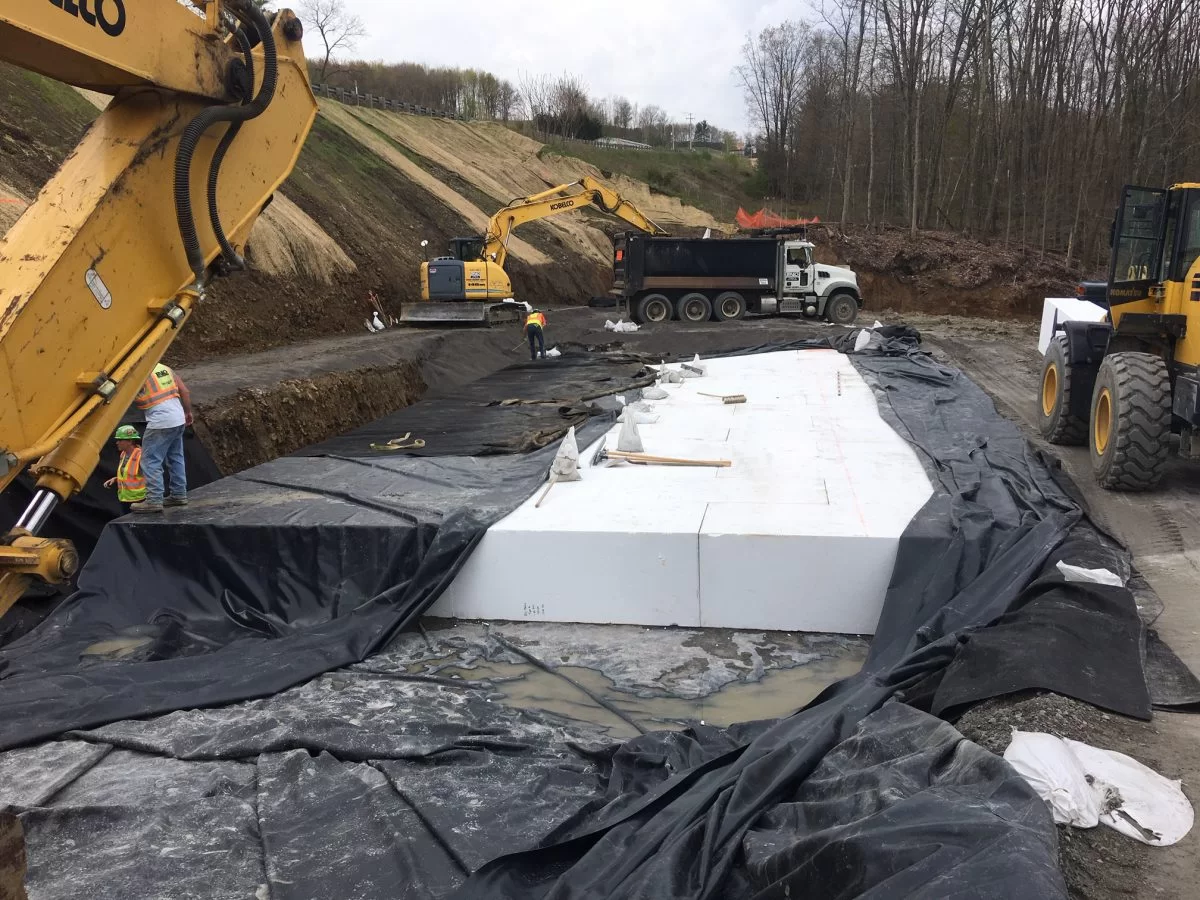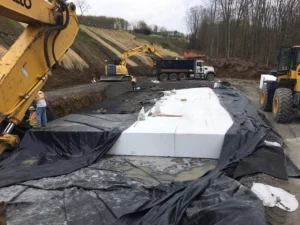Expanded Polystyrene (EPS) Geofoam has become a preferred solution in construction due to its lightweight structure and high-performance characteristics. It plays a vital role in applications ranging from roadways and bridges to building foundations and landscaping projects.
While EPS Geofoam offers numerous engineering advantages, one critical vulnerability limits its use in certain scenarios: it degrades rapidly when it comes into contact with hydrocarbons and petroleum-based substances.
Here’s how to effectively safeguard your EPS Geofoam installations from that risk.
Table of Contents
- Speak to a Coated Fabric Specialist
- EPS Geofoam: Durable When Properly Shielded
- Geomembrane Solutions for EPS Protection
- Why E Squared is Your Ideal EPS Protection Partner
Speak to a Coated Fabric Specialist
EPS Geofoam: Durable When Properly Shielded
EPS Geofoam is unique in that it offers a combination of structural strength and minimal weight, which reduces stress on underlying soils. Its thermal insulation capabilities and ability to absorb seismic vibrations make it invaluable in many types of construction.
Time and cost efficiency are additional benefits. The block format of EPS Geofoam accelerates project timelines, helping reduce overall installation expenses. Thanks to rigorous quality standards, it also delivers consistent and reliable performance.
In applications like road construction, environmental conditions—including chemical content in soil and water—are essential considerations. Fortunately, EPS Geofoam is inert to common underground substances, which contributes to its exceptionally long service life when shielded from external chemical threats.
Geomembrane Solutions for EPS Protection
The one major caveat with EPS Geofoam is its extreme sensitivity to petroleum products. Even small hydrocarbon spills can lead to irreversible damage. In transportation projects, where accidental fuel spills or leaks are real possibilities, this risk becomes especially significant.
The most effective defense against such threats is the use of a petroleum-resistant geomembrane (PRG). Think of it as an impermeable barrier that completely envelops the EPS block. This protective layer won’t interfere with the performance of the EPS itself, but it will prevent any direct exposure to harmful substances.
Hydrocarbons are aggressive in nature, and selecting a material that can resist their corrosive effects over time is challenging. PRGs offer the ideal solution—especially when reinforced with fabric for enhanced dimensional stability and durability under load.
For optimal protection, a reinforced EIA (Ethylene Interpolymer Alloy) geomembrane is recommended. These materials not only withstand prolonged exposure to petroleum compounds, but their flexibility and drape characteristics allow them to conform closely to the EPS blocks, minimizing gaps and potential vulnerabilities.
Key performance criteria often specified by transportation agencies, such as a minimum breaking strength of 600 pounds, are typically met by these reinforced EIA membranes. In contrast, other options fall short:
- TPU: Too costly and lacks long-term durability
- PVC: The plasticizers can degrade EPS over time
- HDPE/LLDPE: Too rigid to effectively wrap around geofoam blocks
EIA stands out as the preferred solution due to its strength, flexibility, and compatibility with EPS.
When selecting a PRG, you should also evaluate environmental conditions, intended usage, and budget to ensure the best fit. Many departments of transportation (DOTs) already mandate PRGs for EPS Geofoam projects.
Why E Squared Is the Partner You Need for EPS Geofoam Protection
E Squared brings decades of innovation and expertise to the technical textiles space, offering customized solutions that combine performance, reliability, and cost-efficiency.
For EPS Geofoam applications, E Squared supplies several types of reinforced EIA geomembranes that are engineered to perform under the most demanding conditions. Their in-house fabrication capabilities allow them to weld and test seams in a controlled environment—minimizing the quality issues commonly associated with field installation.
But E Squared goes beyond manufacturing. The team provides expert consultation, guiding you from product selection through to installation strategies. When you work with E Squared, you’re gaining a partner committed to helping your project succeed—from start to finish.


